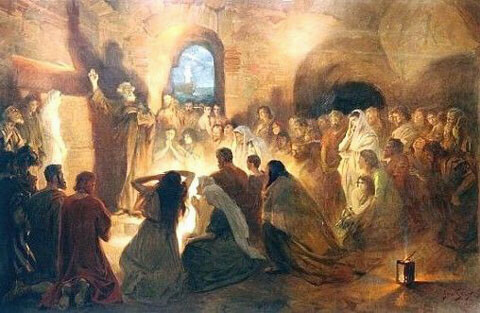Let me share two original poems and my best advice as to not fall for spiritual abuse ever again!
This site earns funds via links to Amazon. See the footer below.
Let me share two original poems and my best advice as to not fall for spiritual abuse ever again!
I don’t remember a time when I was non-compliant. Growing up, I remember only one spanking, from my Papa, and I didn’t even know what it was for. All my mom had to do was look at me sternly, and I would send myself to my room, crying. I was a people-pleaser, even as a small child. If they were happy, I was happy.
A child of divorced and remarried parents living in the midwestern United States, I was a typical statistic. Still, I was mostly carefree, if not a bit odd when I was young. I dressed up in “princess dresses” whenever I got the chance. I spun around in the field and acted out my favorite Disney princess scenes alone during school recess. My obsession with storms and tornadoes predated Twister. My grades were always impeccable because, again, people-pleaser. I followed rules. Rules made the world run smoothly, and told me what to expect.
I was carefree until I turned nine, at which time my Nana recalls a remarkable change in my personality. I became withdrawn, spending more and more time in my room, escaping into books and writing. I cried in private and slept a lot. Some days I was sunshine, others I was a monsoon. Still, I clung to those rules. I wanted to make other people happy, even if I wasn’t. Inheriting my parents’ crazy sense of humor, this was how I first learned to mask.
Both of my stepparents were emotionally-abusive at times for different reasons, though I didn’t recognize it as such at the time. My stepdad would fly off the rails at me if I stayed up too late reading, or didn’t do a chore. My stepmother bullied me about my creeping weight gain (it later turned out I had an endocrine disorder). All I knew is that I had to try harder. Watch the clock. Eat less at dinner. They weren’t happy with me, and it scared me, because it meant I was failing.
But even that didn’t account for the change—why I so abruptly transformed. To this day, I still don’t know. But it was a catalyst that opened up wounds that were susceptible to the poison that would later seep in.
I lived in a good, Christian home. We went to church (mostly non-denominational, but at one point, a fundamentalist church very similar to the IFB, which was a nightmare for me. I’ll get into that another time.). But I still had those suns and storms. When unexpected things happened, I was scared. If I upset my stepdad again, I’d cry and shake under the covers. (My older siblings were not people-pleasers like me and eventually went to live with our father. I was too attached to my mom to leave her side.) When I felt I’d pleased my parents, I was on top of the world, and all was right. Things were safe and secure.
As I got older, my mental state only got worse, but it also sparked creativity. I had a small, but encouraging group of friends who would read my stories and listen to my “concerts”. I had good things going for me as well, not just the bad. At one point, I was in The Saint Louis Children’s Choir. In spite of my problems, the future was anything but bleak.
But then mom’s depression got really bad, especially after giving birth to my younger brother, followed closely by my two younger sisters. We stopped going to church, which at the height of the Left Behind/rapture/satanic-panic craze, scared the tar out of me. “Growing cold” in your faith meant hellfire and demonic attacks. As far as I was concerned, my foundation was shaken. I was home-schooled from eighth grade on, so no church also meant I was more socially isolated, which worsened my own depression and anxiety.
It was a nightmare scenario for a young, mentally-ill (and, at the time, undiagnosed autistic) girl.
One of my neighborhood friends had recently joined a strange church up the road and had started wearing skirts, stopped wearing makeup, jewelry, and didn’t cut her hair anymore. She invited me to church, but I blew her off at first because it was too odd, even for me.
One weekend in October of 2000, when I was only 14, however, my world fell apart. I was at my dad’s house (like I was every other weekend). It was my dad and stepmom’s anniversary and they got into an awful screaming match. My dad left the house. My stepmom cried. She never cried. Despite our problems, it tore me up to see her sitting on the floor, sobbing. So, I stepped out of my compliant shell for the first time and left a scathing voicemail on my dad’s phone, scolding him for his behavior. My stepmom drove me home because I was too scared to stay after I realized what I’d done. I refused to talk to my dad for days, and that was the last time I regularly went to his house.
I had a new void that I desperately needed to have filled. So I called up my friend and begged her to take me to church with her. Little did I realize how vulnerable I really was. How easy it would be for a hunger to be filled with ash and years of decay that would slowly eat away at every bit of light I had left. Often, I wish I had a time machine. But only hindsight is 20/20, so thus my story brings me to a fateful door.
The door of a cult.
Ok – so first off, I’m not saying to stop talking about the Bible, or the story of Jezebel! There is a powerful principle of being unequally yoked together with an unbeliever. In the case of Ahab, a Jewish King, marrying a Canaanite princess, who served many gods was a disgrace to the line of Israel and a continuation, as 1 Kings 16 declares, the sins of many kings before Ahab.
What I actually want to stop talking about, I’m going to talk about it…and that is the effort to use Jezebel as the foundation for the house of cards within the Holiness movement as the anti-make-up and jewelry monument (idol). A statue erected and constantly glorified across pulpits to disparage and to dissuade the usage of such things. You’ll hear all about the Jezebel spirit, the ‘harlot’ spirit. I’ve heard so-called Christian women refer to another woman who wears make-up in such a fashion, “Just look at that Jezebel!”
In fact, the inspiration to this writing is a comment I received on my article Why do some legalists forbid wearing Jewelry and Makeup? that again used the ‘Jezebel’ reference. And I don’t mean to disparage the person making that honest comment, but something glaring came from it that can and should be addressed.
I can’t help but remember a Baptist preacher who taught on the transitional nature of the Book of Acts and how certain people ‘hang their necks’ on certain portions of Scripture without seeing the fullness of the entire testimony. In that particular case, he was speaking of the way in which the Oneness Pentecostal doctrine views Acts 2:38 as the fullness of Gospel salvation (how to get saved) but do not read the rest of the book as the description of history and transition as it was played out.

This was something that my studies also led me to understand. The book of Acts was a description of the forming of the New Testament church, it is a window into the history of the Apostles, early missionary journeys, and incredibly, the way in which the Gospel was opened up to the Gentile bride (Acts 7/8) due to the thrice rejection of the Messiah by the Jewish people.
As we see the transitions take place we also notice some fundamental changes (requirements) because of a shift from a Jewish to a Gentile audience. And there is a difference. (Acts 15, Jewish Believers still maintained the Law of Moses, Gentile Believers did not and are not commanded to) But the description of early church practices, such as communal living, selling all earthly goods was certainly NOT a prescription (commandment) to the entire New Testament church from the days of the Apostles up to the second coming of Christ.
For example, let us look at some very plain prescriptions (commandments) vs. descriptions to illustrate the difference and why it matters in this narrative.
Prescriptive Text:
“Or do you not know that the unrighteous will not inherit the kingdom of God? Do not be deceived: neither the sexually immoral, nor idolaters, nor adulterers, nor men who practice homosexuality, nor thieves, nor the greedy, nor drunkards, nor revilers, nor swindlers will inherit the kingdom of God.” ~ 1 Corinthians 6:9-10, ESV
From this text, we draw very clear and strong conclusions of a commandment. Much like the original commandments that Yahweh gave to Moses, they weren’t ambiguous, unclear, nor arguable or debatable. The pronouncement is clear: People who do certain behaviors will not inherit (enter into) the kingdom of God.
Descriptive Text:
“And awe came upon every soul, and many wonders and signs were being done through the apostles. And all who believed were together and had all things in common. And they were selling their possessions and belongings and distributing the proceeds to all, as any had need.” ~ Acts 2:43-45, ESV
From this text, we draw a conclusion that the early church was very communal, taking care of the physical (food, clothing, shelter) needs of each other as was needed under the persecution taking place, not just from the Roman front, but later a Jewish attack against Christianity.
The times demanded particular behaviors, and while we read about them, we don’t take this description/history as a prescription (commandment) that we are to sell all of our belongings, develop communes and live as a single community.
In a negative light or a positive light, descriptive texts should not be used as foundations or proof texts for prescriptive commandments unless they are coupled with very clear commandments.
Recently, a comment was left on a previous article as I already mentioned. This is not a criticism of the commenter, just an illustration of how this connection happens;
We cannot take just 1 Bible Verse and ‘run away with it.’ We must read the ENTIRE meaning.
They decked their Faces with Paint (Make-up), and put on Ornament (Jewelry) also. Does that not sound like Jezebel to you?
This is in reference to Ezekiel 23, an incredibly strong, blatant, graphic account of the harlotry of Jerusalem and Samaria, symbolized as two sisters who engaged in much prostitution, debauchery, and idolatry who had turned away from the Lord. This prophecy, given to Ezekiel, was intended to provoke the prophet into proclaiming God’s disgust, displeasure, and desire for repentance upon the lands that he called his own. Verse 36 even says, “Son of man (Ezekiel), will you judge Oholah and Ohobilah? Then confront them with their detestable practices.”
The two sisters, Oholah (Samaria, the Gentiles) and Oholibah, (Jerusalem, the Jews) at one point were prophetically (not literally) decked with crowns, bracelets, make-up, oils and fine linens, beds, etc., and then judgment came upon them for their prostitution, adultery, and debauchery. Nowhere in this description, nor elsewhere, does Scripture teach that make-up, and/or jewelry was the prescription for their debauchery, and yet we can see and hear people making this connection via the Jezebel story simply because of the mention in Scripture.
We could conclude, as others have with the make-up and jewelry, that the olive oil, beds, fine linen, and other descriptive items were equally sinful, right? There is no doubt a reason for the mentioning of these things, but to use ‘honorable mentions’ as commandment prescription is dangerous, to the creation of false doctrines.
Jezebel
1 Kings 16-22 recounts the history of King Ahab of Jerusalem who reigned C 874-853 BC and includes the final days of Elijah the prophet who was responsible for the killing of the prophets of Baal (the religion to which Jezebel belonged) (1 Kings 18) and then his fleeing from the wrath of Jezebel in 1 Kings 19.

The problem with Jezebel and Ahab was not the make-up, nor jewelry. Rather, it was that Ahab was far from God, Yahweh, and marrying a princess of Caanan brought with it the need to erect temples to the false god Baal (1 Kings 16:32) in order to please Jezebel.
The story of Jezebel picks back up in 2 Kings chapter 9, long after Ahab’s death. When Elisha anoints Jehu (2 Kings 9:6) as King his first commandment, and seemingly the reason for Jehu’s anointing, is to destroy the house of Ahab and with it, the judgment of Jezebel for the murder of God’s prophets and people that she had wrought in retaliation for the slaying of the priests of Baal by the hands of Elijah. (1 Kings 18:20-22)
And the only portion of this story that comes up in this particular vein of thought is one small verse, that says, “And she painted her eyes and adorned her head and looked out of the window.“, (2 Kings 9:30)
Somehow this simple act of hers, obviously attempting to disarm Jehu with her beauty, is the crux of the story. Little mention is given of her life of sin, murder, worship of false gods, the destruction she brought to the priests of Yahweh. Rather, all the legalists can focus on, is that she painted her eyes and put on a wig. Thus, anyone who paints her eyes and wears a wig…is a Jezebel.
At this point, it seems almost a moot point to iterate again how silly of an argument this is, but there are people who believe it so it is important, in love to explain these things. This article is long for a reason – because we needed the contrast of descriptive vs. prescriptive texts to understand the literary meanings being expressed by the writers, then twisted and perverted by modern readers.
As noted in my original article, Why do some legalists forbid wearing Jewelry and Makeup? there are many locations within Scripture that speak very, very favorably of make-up, and jewelry, the adorning of the body, and indeed even makes the connection with the Bride of Christ (the Church) preparing herself for her groom (Christ). (Rev 21:2)

There are many great resources into the customs of Jewish weddings, the attire of men and women in that ceremony. The 10-coined headdress, necklaces, and other jewelry were part of a traditional, sacred Jewish wedding ceremony. MacArthur and other Bible commentators have made notes about this when reviewing select Scriptures. We even see the God of Heaven and Earth, in the form of man, Jesus Christ, speaking of these coins in the parable of the lost coin in Luke 15:8-10. And in no way did He (Jesus) condemn this, but rather made the analogous connection of the joy a young woman would feel upon finding one of these lost coins as to the joy expressed in heaven when one sinner repents.
We must be very careful not to add anything, or take anything away, from Scripture, in our attempts to honor Scripture. The legalist will add to the word their own concocted dogmas, such as we are speaking about here, while the equal and opposite force will attempt to take things out of Scripture for the sake of not offending people or for allowing sinful behavior. Both are condemned in Scripture. (Deut 4:2, Deut 12:32, Rev 22:18)
Just for the record – I’m not out here arguing these points to get people to do these things. My wife does not wear make-up, and I’ve never asked her to. She doesn’t need to, and only will if she chooses to, and that makes me happy. My purpose is not to endorse the make-up industry but to endorse the proper handling of the Bible.
I realized tonight that I’m reaching two anniversaries, not just one. In December 2009 I walked out of my former church. But what I don’t often think about is that in 1999 I was being “sat down” and nearing a time when I’d be kicked out. Around this time 20 years ago I was begging God to let me stay in a very unhealthy, spiritually abusive church, and around 10 years ago I was walking out of another.
A lot has changed in 20 years. I am no longer afraid of not attending church. I rarely go. I’m no longer afraid of pastors’ disapproval, of hell, or of what a church will think of me. The fear that if the pastor disapproves he can prevent me not only from attending HIS church but others like it no longer bothers me because… well, really, why would I choose to go to an abusive church “like his” or attend a church where the pastor even thinks it IS his church? More than that, I no longer – and haven’t for some time – cringed every year in January and February, wondering what would happen THIS year, remembering that one… the one in 1999, then one where I was convinced I was going to hell because the pastor was abusive.
At the same time, I also no longer celebrate like I did in 1999, 2000 and the years following. The first few years, I had multiple Christmas trees, lights, music, movies… I wore myself out with it and that was probably a good thing. I needed to make that time positive in my mind. This year, though, I haven’t even decorated yet. My job changed a couple years ago and November and early December can be exhausting, but I also don’t need something to keep my mind occupied. I don’t have a need to make the season positive, because it is, whether I have no trees or four. (I also have a very destructive cat, which may also be part of the reason for the lack of decorations.)
It was hard. Every year gets easier. I should have left 20 years ago. Actually I should have left more than 20 years ago, because the man who kicked me out did a lot of damage, and not just to me. Looking back on it all from ten years or twenty, here are some things I know:
Leaving was hard. Especially being kicked out. At least walking out I had anger to motivate me and I could prepare myself. At least I chose my moment and I rejected them, not vice-versa. At least I had some supports in place when I walked out. I was also older and more aware of some things. It didn’t make it easy. Leaving is always hard. But staying would have been impossible.
Happy anniversaries to myself.
As with all of our giveaways, this is only open to those with a USA mailing address.
The true tragedy of this reality is many good people are honestly doing the very best they know how, but are tangled up in this religion. Many people I know are living a life of spiritual bondage with the purest intentions. They feel oppressed, but don’t know why. They are questioning things that maybe don’t feel right to them, dismissing it as their issue. Wanting to ask questions or even leave, but can’t because they fear losing relationships with loved ones or worse, having a reprobate mind and going to hell. This is why I cannot keep my mouth shut. They are the reason I want to share my story. – Jennifer Brewer
This is your chance to receive a new copy of Free: From Legalism to Grace Breaking Out of the United Pentecostal Church by Jennifer Brewer. One copy will be given away. The book was released in August 2019 and is the third memoir from 2019 that deals in part with the United Pentecostal Church. Available in paperback and Kindle, it is 124 pages and sells for $6.99 or $3.99 for the Kindle version. If you purchase the paperback, you can receive the Kindle for only 99 cents. Earlier this year we were able to give away three copies of the first UPCI related memoir from 2019, The Uncomfortable Confessions of a Preacher’s Kid by Ronna Russell, and have a current giveaway in progress for Let’s Go to California: The Story of the Singing Holley Family by Margaret Toedy Duke.
The idea of leaving although appealing was daunting. I was acutely aware of how everyone would think about us. All of the people we knew and loved, including my family, would genuinely be concerned for our souls. They would feel we had left the “truth” and be bound for hell. They would view us as souls to be saved, their personal mission field. …From the beginning, we had wanted nothing more than to reaffirm our childhood beliefs by studying out God’s word. Instead, God guided our studies from the get-go and had shown us in indisputable ways the errors of our current doctrine.
This giveaway is a drawing and not a first come, first served giveaway. To enter, just leave a comment to show you wish to be included. The drawing will close on Saturday August 24 at 8pm (eastern time), after which I will draw the winner. You will then need to email me your mailing address if I do not already have it. There is absolutely no cost to enter. Don’t be alarmed if your comment does not immediately show as they require approval when you are commenting for the first time.
We always provide these at no charge to our readers. Two copies of this book were previously given away in our support group on Facebook. If anyone would like to help with the expenses involved in providing various spiritual abuse related material to people, you may do so via our Fundraiser at GoFundMe.
